20 Years FSFE: Interview with Vincent Lequertier on AI
In our sixth birthday publication we are interviewing Vincent
Lequertier about crucial aspects of artificial intelligence, such
as its transparency, its connection to Open Science, and questions
of copyright. Vincent also recommends further readings and responds
to 20 Years FSFE.
A PhD candidate at the Claude Bernard university in Lyon who
researches artificial intelligence for healthcare, Vincent supports
software freedom and volunteers for the FSFE in his free time. He
has been a part of the System
Hackers, the team responsible for the technical infrastructure
of the FSFE, for many years. His contribution was valuable in
setting the foundation for the for the good state that the FSFE's
System Hackers team is today. Vincent is also a member of the FSFE's
General Assembly, and participates in the 'Public Money? Public
Code!' campaign. In our interview, Vincent shares his thoughts
answering questions about the current state of AI and its future
implications.
Interview with Vincent Lequertier
FSFE: You are deeply involved in the field of artificial
intelligence. How would you explain to a 10-year-old what AI
is?
Vincent Lequertier: A few years ago I was a
speaker at a local radio station, and sometimes I was responsible
for mixing the audio. At the station, there were several inputs: the
mics of the radio speakers (mine included), the music, the jingles,
and so on. And then there was the output broadcast to the radio
listeners. Between the inputs and output there was the mixing
table, with its uncountable knobs and sliders. I needed to adjust
the knobs and sliders so that the inputs were well mixed together,
thus producing an output that sounded nice to the listeners. At the
time of writing, an AI works just like that. It automatically adjusts
the numerous parameters of a digital, virtual mixing table.
Once put through it, the inputs produce a satisfying output
according to a predefined definition of success (that the sound was
nice in this analogy).

A PhD candidate at the Claude Bernard university in Lyon who
researches artificial intelligence for healthcare, Vincent supports
Software Freedom and volunteers for the FSFE in his free time.
You are advocating for accessible and transparent AI.
According to your research, what would you say are the necessary
requirements to make sure that programs using artificial
intelligence are accessible and transparent?
Reusing AIs makes sense because they are costly to develop and
train, both in terms of human and computer resources. Additionally,
training AI models demands a lot of data which are particularly hard
to obtain and work with. Therefore, being able to reuse an AI is
important, as it saves time and potentially scarce resources.
Moreover, making an AI available to others fosters innovation by
facilitating collaboration. I think a fundamental requirement for AI
accessibility is Free Software, because AIs licensed as Free Software
(also known as Open Source) are inherently accessible. Other
requirements can be Open Standards and Open Data. AI models should
therefore be published and freely accessible.
Transparency in AI is the ability to understand and interpret the
output coming from it. Although given the complexity of today's AI
systems transparency can be hard to obtain, it is an important
characteristic as it fosters trust. Being able to understand why a
given output was produced, and what part contributed the most to it,
increases confidence in the model and makes it easier to debug.
Moreover, understanding the role played by each input can help
data-driven policy making. For example, in healthcare, understanding
the most important factors impacting the quality of patients' care
for a disease can validate or change healthcare practices. Free
Software is a key part of transparency because it allows everyone to
use the AI and analyze its predictions to better understand them.
How can we make sure that inequalities in our current
societies do not pass on to AI data training? How can we assure
that AI results are fair?
As AI is really good at magnifying existing inequalities found in the
data used for its training, fairness issues will creep into AI.
Detecting those issues in the dataset and in the AI's output is
therefore critical. However, simply removing data that might be a
source for unfairness (e.g. a training dataset variable that is not
representative of the data used once the model is put in production)
may not always work, because these data might be correlated to other
attributes in the dataset which would need to be removed as well.
Completely removing any potential inequality may therefore remove a
lot of data from the dataset, potentially limiting the ability
of the AI to properly address the problem it has been designed to
solve. Inequalities therefore come from badly constructed datasets,
and advanced methods are required to circumvent them.
Data related to COVID-19 are public, and
the most popular website to
visualize these data as well as other tools
are Free Software.
To detect fairness issues, a definition of fairness must be decided
upon. For example, fairness may be defined as whether pairs of
similar individuals get similar predictions (individual fairness), or
it may be defined as whether predictions are similar across a
majority and minority group according to some characteristics (group
fairness). This fairness measure may be computed once the AI has
been trained to identify potential unfairness, or may be computed
during the AI training so that it can take the notion of fairness
into account when it adjusts its parameters.
Free Software is also important here, as it allows everyone to check
for fairness issues, whether by inspecting the source code or by
running the AI directly and analysing its predictions.
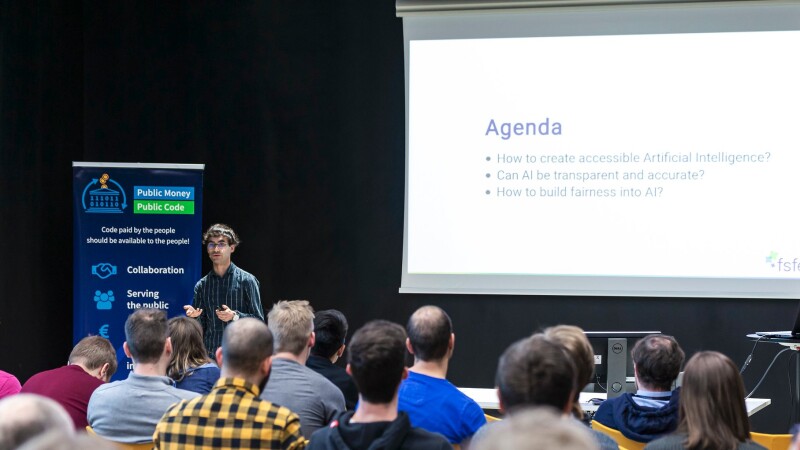
Vincent Lequertier presents crucial points about AI during an FSFE Community meeting in Bolzano. Italy, 2019.
Your research focuses on healthcare, a field that has universally
raised the question of supporting Open Science. To what extent are
health metrics and biometrics open? Is artificial intelligence for
healthcare a big and globally collaborative aim or independent and
competitive?
Well, it depends! Because of security and privacy, access to
individualized healthcare metrics is often restricted and each study
using them must be approved by a ethical committee. However,
aggregated statistics may be widely available. For example, the
website data.gouv.fr has a section
dedicated to healthcare. Also, the data related to COVID-19 are
public, and the most popular
website to visualize these data as well as other tools are Free Software.
The openness and collaborative aspects of research on AI will
improve, partly because scientific journals encourage researchers to
share all the research materials, including source code, and also
because funding institutions can also ask them to do so. [...] I also think that the
line of reasoning around our "
Public Money? Public
Code!" campaign applies for AI research.
However, it should be noted that data without enough granularity can
reduce the AI's performance in healthcare, as, just like humans,
an AI application needs to have detailed information, especially if
the goal of the AI is to make predictions at the individual level.
Because healthcare outcomes are so dependent on context, prediction
abilities depend on specific healthcare situations. More open data
and more Free Software (i.e. Open Science) make it easier to
collaborate. A shared dataset released under a Free Software licence creates a "playground" where AI
models can be easily compared and where we can create benchmarking
tasks, such as hospital length of stay prediction. Without a proper
benchmarking task, finding methodological improvements is harder. An
example of an open dataset for healthcare is MIMIC.
Also, a lot of papers about AI research are freely available on arxiv.org. I
think the openness and collaborative aspects of research on AI will
improve, partly because scientific journals encourage researchers to
share all the research materials, including source code, and also
because funding institutions can also ask them do do so. For example
the Horizon 2020 program of the European Union values
Open Science.
I also think that the line of reasoning around our "Public Money? Public Code!"
campaign applies for AI research.
A common expectation for the future of AI is that it can have abrupt
economical and societal impact by making many job positions
redundant. Do you see this as a possibility for the upcoming years?
If so, is there any practice that could alleviate these
consequences? Would Free Software be one?
I think AI has come a long way in the last ten years. It is more and
more able to organize and structure information. The fields which
have made the most impressive progress are natural language
processing (i.e. tasks involving text such as sentiment analysis) and
computer vision (i.e. tasks involving images such as image
classification). In natural language processing, deep learning models
can semantically understand words and documents as well as the
relationships between them. So I think the jobs where AI will be able
to assist us (I consider things only from a technical point of view
here) are the jobs dealing with a lot of structured information that
needs to be understood, processed, and memorized, as AI is becoming
better at this than us. For example, AI-based software has shown
good results in assisting in radiology,
legal document analysis, and programming (see next question). So
it's possible that AI makes people more efficient, which would
reduce the amount of human work required. However, this work would
require skills where AI does not work well at the time of writing,
such as creativity or emphatic and thoughtful communication.
The jobs where AI will be able to assist us (I consider things only
from a technical point of view here) are the jobs dealing with a lot
of structured information that needs to be understood, processed, and
memorized, as AI is becoming better at this than us. For example,
AI-based software has shown good results in assisting in
radiology,
legal document analysis, and programming.
If AI is bound to get better, and will at some point have the
capacity to completely automate some work, transparency and fairness
can only become more and more important. Although not sufficient,
Free Software is a big part of what helps putting strong
safeguards in place.
However, I don't think it's up to the scientific community to design
policies around employment. Putting together a proof of concept or
finding a novel theory that could automate some work is not a reason
for implanting it in everyday lives. In the past years, the EU has
already had to deal with AI applications that are impressive
technically but raise ethical concerns. For example, the Clearview AI
facial recognition platform has been judged illegal in some EU
countries, and citizens have the right to opt out from this
technology. The next few years will be important with regard to AI
ethical concerns, and the upcoming EU Artificial Intelligence Act
might play a big role in it.
And finally, although I'm not a historian, I think that over the last
centuries we have made tremendous technological progress and
society has always evolved along with it. Thinking about the past
challenges of technological improvements would help us to
understand whether they would be different this time around, and how to
deal with them as best as we can.

FSFE Community Meeting during Rencontres mondiales du logiciel libre conference in Strasbourg. France, 2018.
What legal issues do you think will be raised regarding AI in the
next ten years? Would it be issues of ownership or responsibility?
For example, we are already seeing ethical and technical aspects of
the AI ownership in Github's Copilot. We
are interested to know what the upcoming crucial questions are,
according to you.
Issues around ownership and responsibility will be very important,
and Copilot is a prime example of that, where the fundamental
question is whether AI creations can be considered as novel ideas,
and, if they do, whether they are copyrightable on their own.
Specifically on Copilot, the fact that a code completion tool may
yield straight
copies of licensed work can be problematic, as, at the time of
writing, the AI does not know the licence under which the source of
autocompleted code is released, and how the licence should be
respected. For example, to the best of my knowledge, it is not clear
whether code autocompleted by Copilot originally released under the
GNU Public Licence makes the rest of the project a derivative work.
Being able to freely use source code often comes with obligations
that need to be fulfilled, regardless of whether it is accessed by an
AI or a human being. Our REUSE
project, which aims to make it easier to programmatically
understand how a project and its diverse components are licensed, may
help building licensing-aware programming tools. The same legal
troubles apply to other models able to generate content, in domains
such as in painting or in music production.
Another legal issue is with patents, where the question of
whether an AI can be a patent author is still undecided. In
the UK and EU, a patent whose inventor was an AI was rejected because
they considered that AI does not have a legal personality and cannot
have a legal right over its output. But a couple of months ago, the
first patent which lists AI as the inventor was approved.
The fundamental question is whether AI creations can be considered as
novel ideas, and, if they do, whether they are copyrightable on their
own.
Is there any book about artificial intelligence you would like to recommend to our readers?
I can't recommend "Genesis" from Bernard Beckett enough. It is a
small novel showing a philosophical debate around the questions of
what it means to be human and of whether machines can have
consciousness. The classic "I, Robot" from Isaac Asimov also raises
many questions that make a lot of sense today (it was published in
1950!) If we are building autonomous robots with some freedom of
action, what safeguards must we put in place? The book is really
about how to ensure AI works as intended.
You have been a part of the FSFE for several years. What is an
important thing that you learnt from this experience?
I learnt that Free Software can be viewed from a lot of different
angles and is not only a technical topic. This translates into the
diversity and breadth of our community. This diversity is a huge
strength.
And what is a story that still makes you smile when you remember it?
My first FOSDEM in 2019. I met some awesome people from our
community. That was really heartwarming.
As a last question, what do you wish the FSFE for the next 20 years?
I wish the FSFE will be able to tackle the challenges ahead. The next
years will be full of innovations that will make technology even more
ubiquitous in our lives. I hope we will be able to keep spreading the
word about Free Software and the values behind it.
Being able to freely use source code often comes with obligations
that need to be fulfilled, regardless of whether it is accessed by an
AI or a human being. Our
REUSE
project, which aims to make it easier to programmatically
understand how a project and its diverse components are licensed, may
help building licensing-aware programming tools.
FSFE: Thank you very much!
About "20 Years FSFE"
In 2021 the Free Software Foundation Europe turns 20. This means
two decades of empowering users to
control technology.
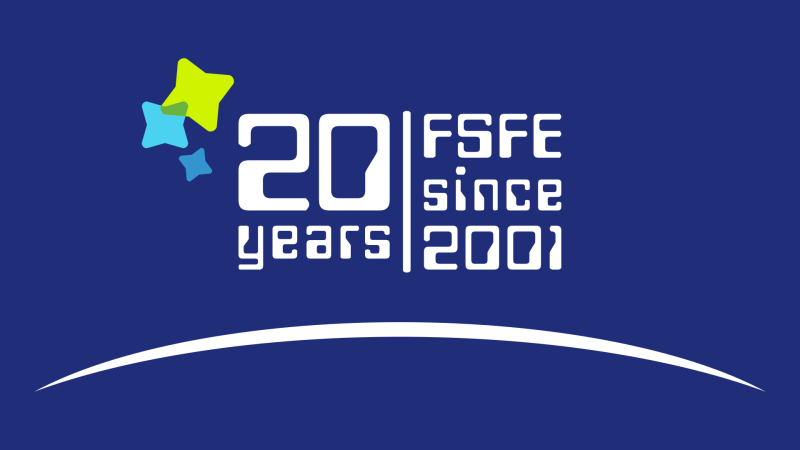
Turning 20 is a time when we like to take a breath and to look back
on the road we have come, to reflect the milestones we have passed,
the successes we have achieved, the stories we have written, and
the moments that brought us together and that we will always
joyfully remember. In 2021 we want to give momentum to the
FSFE and even more to our pan-European community, the community
that has formed and always will form the shoulders that our
movement relies on.
20 Years FSFE is meant to be a celebration of everyone who
has accompanied us in the past or still does. Thank you for your
place in the structure of the FSFE today and for setting the
foundation for the next decades of software freedom to
come.
Support FSFE
 Device neutrality principles
Device neutrality principles

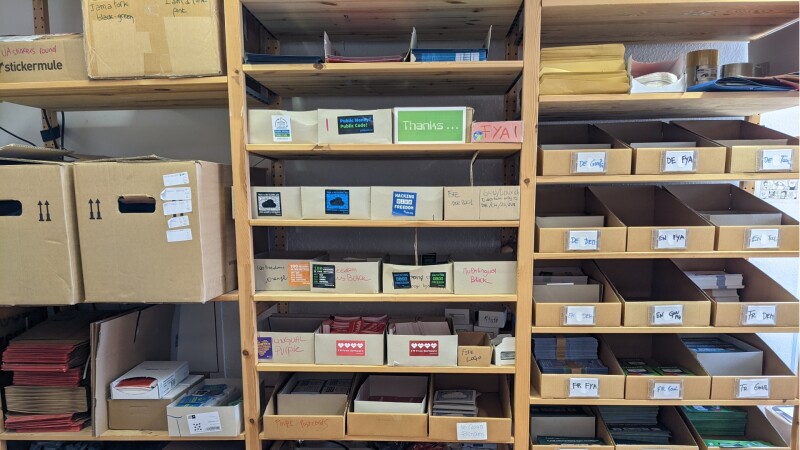
 A PhD candidate at the Claude Bernard university in Lyon who
researches artificial intelligence for healthcare, Vincent supports
Software Freedom and volunteers for the FSFE in his free time.
A PhD candidate at the Claude Bernard university in Lyon who
researches artificial intelligence for healthcare, Vincent supports
Software Freedom and volunteers for the FSFE in his free time.
 Vincent Lequertier presents crucial points about AI during an FSFE Community meeting in Bolzano. Italy, 2019.
Vincent Lequertier presents crucial points about AI during an FSFE Community meeting in Bolzano. Italy, 2019.
 FSFE Community Meeting during Rencontres mondiales du logiciel libre conference in Strasbourg. France, 2018.
FSFE Community Meeting during Rencontres mondiales du logiciel libre conference in Strasbourg. France, 2018.

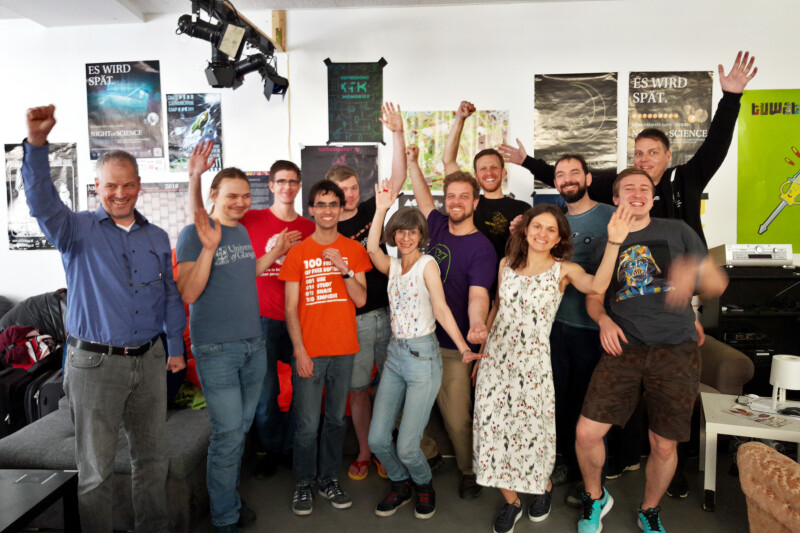 Group picture of our 2019 web-a-thon in Frankfurt
Group picture of our 2019 web-a-thon in Frankfurt
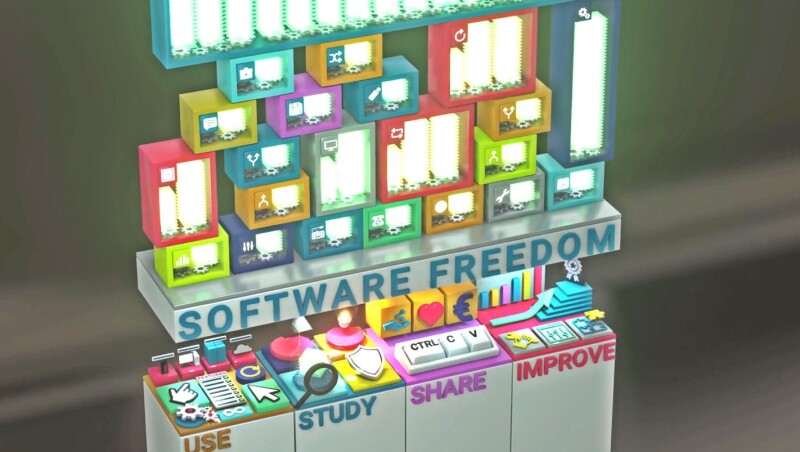
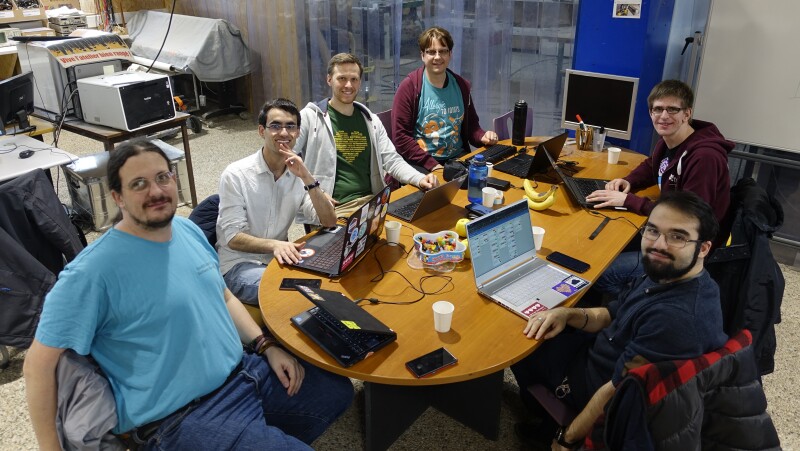 Picture from the 2020 meeting of the System Hackers in Lyon
Picture from the 2020 meeting of the System Hackers in Lyon